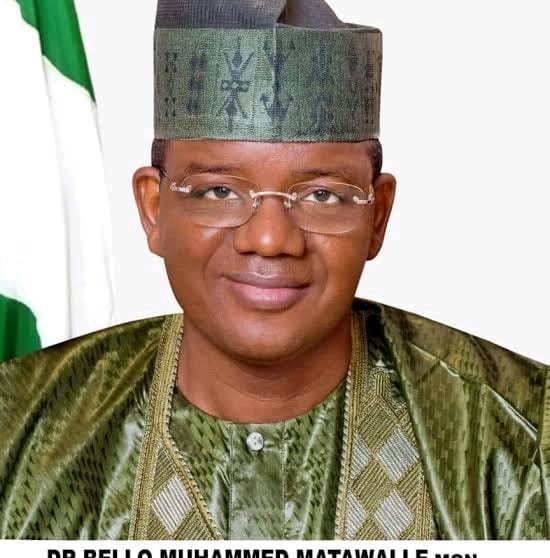MATAWALLE AND HIS WIZARDRY ON SECURITY ISSUES
By Alhassan Dantani
On the night of 17 November 2025, the people of Danko-Wasagu in Kebbi State went to bed with dread in their hearts. By dawn, 25 schoolgirls had been dragged from their hostels by armed bandits. One escaped into the bush; the remaining 24 vanished into a forest that had swallowed too many before them. Phones rang in Birnin Kebbi, then in Abuja. Mothers collapsed. The nation watched, helpless—again.
Then came the call from the President. Dr Bello Matawalle did not send a delegation. He did not issue a statement from a conference room. He packed a small bag, boarded a military aircraft, and relocated to the epicentre of the crisis. Within hours he was in the field, coordinating air and ground units, speaking directly to community leaders who trusted him because they had known him for decades, and pressing every intelligence lever he had built across the North-West.
Four days later—on 25 November—24 girls walked out of the forest alive, handed over without a single ransom paid. Their release was not luck. It was the direct result of a man who refused to fight yesterday’s war and instead brought the full weight of his experience, networks, and relentless will to bear in real time. That is the measure of Dr Matawalle: when the President says “fix it,” he moves himself to the battlefield and fixes it.
Matawalle is no stranger to the theatre of war. Long before he became Honourable Minister of State for Defence, he had already confronted the monster of banditry head-on as Governor of Zamfara. He orchestrated the ransom-free rescue of over 300 schoolgirls from Jangebe in 2021 and turned a state once written off as ungovernable into a laboratory of innovative security.
When President Tinubu needed someone who knew the terrain, the people, and the enemy intimately—someone who could fuse dialogue with decisive force—the choice was obvious. From the moment he assumed national office, Dr Matawalle hit the ground running.
Over 8,000 terrorists neutralised, more than 16,000 captured or surrendered, 10,000 weapons recovered, notorious kingpins like Kachallah Buzu permanently removed from the equation. These are not abstract statistics; they are nights when villages slept without posting guards, roads that traders now travel without paying “tolls” to criminals, and—most recently—24 little girls returned to their classrooms instead of their graves.
A devoted student of Sun Tzu and Clausewitz, he fights on ten integrated fronts: blistering intelligence, rapid-reaction mobility, psychological operations, logistical strangulation, technological dominance, community ownership, diplomatic isolation of the enemy, precision strikes, troop welfare, and the strategic blend of carrot and stick.
Matawalle anticipates because he understands the bandit’s mind; he strikes because he knows every ravine and cattle track they once called sanctuary. Drones now own the sky. AI parses chatter in seconds. Community Protection Guards—local sons trained and armed—watch over 19 emirate councils in Zamfara.
Three new forward operating bases in Isa, Sabon Birni, and Goronyo have slashed response times to minutes. Eighty CNG-powered gun trucks and over 200 Hilux vans have turned pursuit into inevitability. Turkish-built long-range patrol vessels secure the Gulf of Guinea. A landmark MoU with Chinese manufacturers has jump-started local production of small arms, drones, and protective gear at DICON.
These are not projects on paper; they are tools already saving Nigerian lives. But hardware is only half the battle. Through deft psychological operations and genuine community programmes, thousands who once carried rifles for bandits have laid them down and taken up new lives.
Over 700 civil society organisations and the North-West Youth Movement Forum have publicly hailed a leader who rescues first and punishes only when necessary. Victim rescue rates have soared by over 66 %. Kidnapping in the North-West is down 27 %.
Nationwide security incidents fell 32 % in 2024, with a projected 66 % drop by the end of 2025. Oil theft losses have been cut by more than ₦120 billion, with ₦5 billion ploughed back into host communities. When history records how Nigeria finally broke the back of banditry and insurgency, it will linger on moments like the morning of 25 November 2025 in Kebbi—when 24 schoolgirls, barefoot and dusty but gloriously alive, ran into the arms of parents who had begun to lose hope.
In that embrace was the vindication of a President who picks the right man for the hardest job, and of a Minister who treats every abduction as personal.
Under Dr Matawalle’s command, Nigeria is no longer managing crises or praying for miracles.
We are ending nightmares—one rescued child, one neutralised camp, one surrendered fighter at a time. The storm that once raged unchecked across the North-West is meeting a man who walks straight into it… and makes it change direction. That is not wizardry. That is leadership delivered.
***Dantani writes from Birnin-Kebbi












